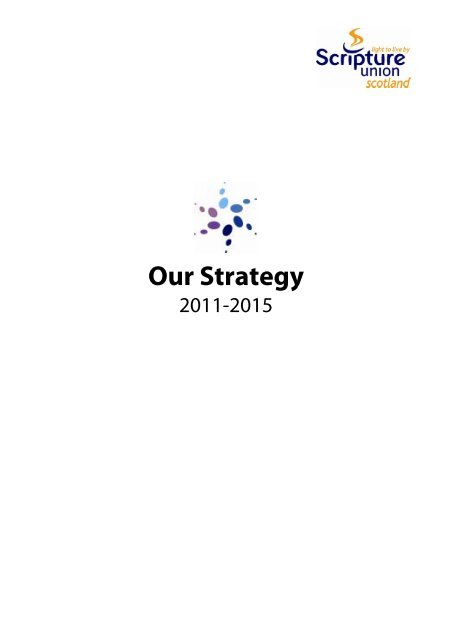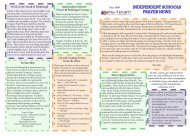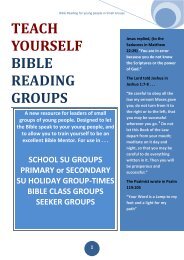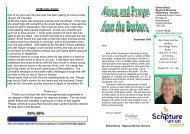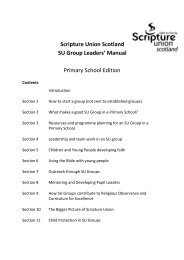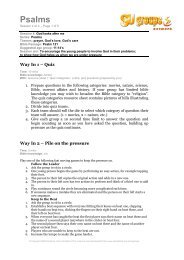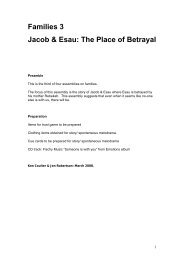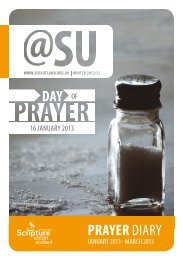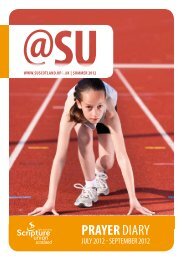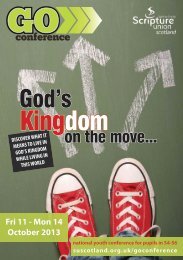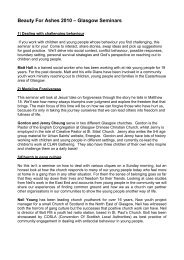Strategy 2011-15 Full document - PDF - Scripture Union Scotland
Strategy 2011-15 Full document - PDF - Scripture Union Scotland
Strategy 2011-15 Full document - PDF - Scripture Union Scotland
- No tags were found...
Create successful ePaper yourself
Turn your PDF publications into a flip-book with our unique Google optimized e-Paper software.
Our <strong>Strategy</strong><strong>2011</strong>-20<strong>15</strong>
IntroductionIntroductionWe are very grateful for our heritage in <strong>Scripture</strong> <strong>Union</strong> (SU) <strong>Scotland</strong> and particularly for thosewho laid such solid foundations for the work. We are also grateful to an amazing band ofvolunteers and supporters who make this work possible. Most of all we are grateful to God, who inhis son Jesus Christ has provided forgiveness, purpose and hope and who by his Spirit continues toequip and strengthen for service in the world.This <strong>document</strong> sets out SU <strong>Scotland</strong>’s strategy for the next 5 years. The development of thisstrategy has involved:1. Dependence on GodDependence on God is a headline value for SU <strong>Scotland</strong>. We have tried to make this value areality during the strategy process by committing every aspect of the strategy to God in prayeras we have sought to discern God’s will for us in SU <strong>Scotland</strong>. However, we do not suggest thatwe are so in tune with God that this strategy is a divine blueprint. We remain dependent onhim and open to sensing fresh direction as he guides us.2. ConsultationThe process was initiated and overseen by the SU <strong>Scotland</strong> Board. The Board met in February2009 to establish the process and a core group 1 to lead the development of the strategy. Onemajor concern was to consult widely, and the following groups of people contributedsignificantly, along with many individuals:• The Centres and Holidays and Regional Ministries Board Committees;• SU Staff, particularly the Regional Ministries Staff team;• Holiday Team Leaders;• The SU Student Exec;• Church leaders, consulted through 4 consultation events.3. EvaluationWe have developed this strategy against the background of the 2006-2010 strategy and therapidly changing environment in which we work. The major outcomes of these discussionswere:• The 2006-2010 strategy with its 6 priority areas (Prayer, Schools, Residential, Missions,Training and On-line) had been easily assimilated and had set very clear numerical targets (asummary review of the 2006-2010 strategy is provided in Appendix 1). The majorimplications for the present strategy were:1Members of the Core Group: Andy Bathgate (Chief Exec), Gordon Brown (Board Vice Chair), RobinMacLellan (Director of Support Services), Neil Maclennan (Board Member), Christine Murison (Director ofCentres and Holidays), Jackie Ringan (East Team Leader), Stuart Smith (Volunteer), Phil Wray (Director ofRegional Ministries)<strong>Scripture</strong> <strong>Union</strong> <strong>Scotland</strong> 2Our <strong>Strategy</strong> <strong>2011</strong>-20<strong>15</strong>
Introductioni. That qualitative elements should be given equal consideration alongside quantitativemeasures, and means identified to evaluate these softer targets.ii.That we should seek for a more integrated approach across our ministry streams,rather than defining strategy priorities departmentally.• We examined the implications for our ministry of the political/economic, social, cultural,technological, educational and church environment (a summary is provided in Appendix 2).The major implications we identified were:i. Political / economic factorsWe may be subject to increased pressure from a secularising agenda, for examplethrough further changes in anti-discrimination legislation which may challenge ouremployment policies. We will remain vigilant through our HR department and alsothrough involvement with the Evangelical Alliance and other bodies.ii.iii.iv.Social factorsWe are aware of less community cohesion and the increasingly impulsive nature ofsocial interaction; yet alongside this there is a strong desire for community. We havethe opportunity to provide genuine community experience but will require to bemore fleet of foot in organisation to accommodate rapidity of change.Cultural influences / technological changesAlthough social networking is hugely influential and must be a major part of ourmeans of communication we will continue to stress the priority of face to face contact.Whilst maximising the benefits which come from the developments in socialnetworking, not least in optimising contact and communicating our support needs,we will not ignore its limitations. The decline in assimilation of information throughreading books has implications for traditional approaches to Bible reading. However,the possibilities are great for an increase in the use of story-telling. There is also agreater concern amongst children and young people to be engaged with issues ofjustice which we must build on in our work.Educational trendsIn the coming years our work will continue to be moulded by the approach ofCurriculum for Excellence and by the closely linked ‘Getting it Right for Every Child’ 2initiative, which contain many of the aspirations outlined in our own strategy. The‘Bridging the Gap’ 3 <strong>document</strong> emphases the importance of linking youth work andschools, also demonstrating significant overlap with our vision. There will be majorstaff turnover in the next few years in education which may mean working with those2Getting it right for every child www.scotland.gov.uk/Publications/2008/09/22091734/5 - 16 Oct 20083Bridging the Gaphttp://www.ltscotland.org.uk/curriculumforexcellence/buildingthecurriculum/partnership/schoolsandyouthwork/index.asp<strong>Scripture</strong> <strong>Union</strong> <strong>Scotland</strong> 3Our <strong>Strategy</strong> <strong>2011</strong>-20<strong>15</strong>
Introductionwho know little of SU <strong>Scotland</strong>. However, it does provide an opportunity for Christianinfluence in education if we can encourage Christians to enter education.v. Church / Christian sceneThe lessening importance of printed Christian resources is already upon us and weneed to continue to adjust to this change. There is also the rise of fresh expressions ofchurch / ‘emerging’ church in its varied forms amongst which there are thoseattempting to re-frame the gospel. These changes bring both huge challenges andmany fresh opportunities.As we have prayed and consulted and evaluated, we have found ourselves strongly re-affirmingthe core of SU <strong>Scotland</strong>’s work: to reach children and young people with the message of JesusChrist and to work primarily in schools, through residential ministry, with churches in missions andon-line.However, we have been challenged to reassess how we do ministry and the present strategyidentifies some key ways in which we will review our practice and implement change: engagingfaithfully with the Bible, how we work with the churches, the importance of prioritising thedisadvantaged and the nature of making disciples are just some examples.Although the strategic plan has been prepared nominally for the next five years, we are consciousthat the vision, values and aspirations are not time-limited, while the itemised activities andtargets may be for variable periods and subject to change even over the five year period,depending on prevailing circumstances and opportunities.We move forward with a sense of excitement. There are still many openings for the work of SU<strong>Scotland</strong> and we want to be able to grasp these in the coming years. We will need wisdom,flexibility and fresh resources. But dependence on God will be of greatest importance if anythingof eternal significance is to be accomplished.Alasdair Morrison (Chair of the SU <strong>Scotland</strong> Board)Andy Bathgate (Chief Exec)<strong>Scripture</strong> <strong>Union</strong> <strong>Scotland</strong> 4Our <strong>Strategy</strong> <strong>2011</strong>-20<strong>15</strong>
Executive SummaryExecutive Summary: <strong>Strategy</strong> <strong>2011</strong>-20<strong>15</strong>1. The aims of <strong>Scripture</strong> <strong>Union</strong> | Page 7We re-affirm the international context of the work of SU <strong>Scotland</strong>. As part of the internationalmovement we commit to the aims of <strong>Scripture</strong> <strong>Union</strong>:‘Making God’s good news known to children, young people and their families andencouraging a daily meeting with God through Bible reading and prayer. ‘These aims and our partnership with SU around the globe are core to our work.2. The Vision and Values of SU <strong>Scotland</strong> | Pages 8-9In a Scottish context the international aims are worked out through a specific visionundergirded by two values:• Our Vision is…to see the children and young people of <strong>Scotland</strong> exploring the Bibleand responding to the significance of Jesus.‘Exploring the Bible’ is stated explicitly in this strategy to re-assert its fundamentalplace in SU <strong>Scotland</strong>’s work. In consequence we will be initiating a full evaluation ofwhere and how we are engaging with the Bible in all our work.• Our Values are…dependence on God and deepening relationships.These remain unchanged as they continue to express our desire to be fullycommitted to God and fully committed to people in relational ministry.3. The difference we want to make in the next 5 years | Pages 10-13Built on the Vision and Values, we have 6 key aspirations, to provide opportunities for:• Deepening relationships;• Responding to the significance of Jesus;• Exploring the Bible;• Prayer for and by the children and young people of <strong>Scotland</strong>;• Equipping for Service;• Supporting the ministry.This will happen in and through schools, residentials, missions, on-line and throughtraining and equipping. Some initial questions for consideration are:- What difference do we want to make in the lives of the children and young peopleof <strong>Scotland</strong>? (Page 11)- What training, support and resourcing will be required in order for that to happen?(Pages 12-3)4. SU <strong>Scotland</strong>’s main activities <strong>2011</strong>-20<strong>15</strong> | Pages 14-16The activities we will engage in so that the aspirations can be fulfilled. This is laid out more fullyin Appendix 4.<strong>Scripture</strong> <strong>Union</strong> <strong>Scotland</strong> 5Our <strong>Strategy</strong> <strong>2011</strong>-20<strong>15</strong>
Executive Summary5. The 4 Emphases | Page 17A fuller explanation of the emphases of prioritising the disadvantaged, working with thechurches, taking account of the family context and evaluating our ministry.6. Resourcing the <strong>Strategy</strong> | Pages 18-19Changes will be needed in structure and personnel if this strategy is to be implemented. Thissection raises initial thoughts and questions to be considered.7. Appendices• Appendix 1 Review of strategy 2006-2010 | Pages 20-21• Appendix 2 SU <strong>Scotland</strong>’s Values | Pages 22-24• Appendix 3 Context Analysis | Pages 25-26• Appendix 4 Activities <strong>2011</strong>-20<strong>15</strong> | Pages 27-29Including alternative presentations and a detailed breakdown of SU <strong>Scotland</strong>’s activities forthe next five years.<strong>Scripture</strong> <strong>Union</strong> <strong>Scotland</strong> 6Our <strong>Strategy</strong> <strong>2011</strong>-20<strong>15</strong>
Executive SummaryThe aims of <strong>Scripture</strong> <strong>Union</strong>SU <strong>Scotland</strong> is part of a worldwide family of <strong>Scripture</strong> <strong>Union</strong> movements in over 130 countries. Asa member of this family we commit ourselves to supporting the work of <strong>Scripture</strong> <strong>Union</strong> aroundthe world, and affirm our commitment to the following statement:Working with the churches, <strong>Scripture</strong> <strong>Union</strong> aims:i. To make God’s good news known to children, young people and families;ii. To encourage people of all ages to meet God daily through the Bible and through prayer.So that they may:• Come to personal faith in our Lord Jesus Christ;• Grow in Christian maturity;• Become both committed church members and servants in a world in need.<strong>Scripture</strong> <strong>Union</strong> pursues these aims through a variety of specialist ministries around the world inobedience to our Lord Jesus Christ and in reliance on the Holy Spirit.The Aims, Beliefs and Working Principles of <strong>Scripture</strong> <strong>Union</strong>, agreed by the International Council of<strong>Scripture</strong> <strong>Union</strong> in 1992, forms the basis for the work of SU <strong>Scotland</strong>. (A copy of the <strong>document</strong>‘Aims Beliefs and Working Principles of <strong>Scripture</strong> <strong>Union</strong>’ is available at www.suscotland.org.uk).<strong>Scripture</strong> <strong>Union</strong> <strong>Scotland</strong> 7Our <strong>Strategy</strong> <strong>2011</strong>-20<strong>15</strong>
The difference we hope to see in the next 5 yearsThe Vision of SU <strong>Scotland</strong>The aims of <strong>Scripture</strong> <strong>Union</strong> International form the background to all we do as a movement.Within <strong>Scotland</strong> our specific vision is to see:the children and young people of <strong>Scotland</strong>exploring the Bible and responding to the significance of Jesus.SU <strong>Scotland</strong> works to increase the opportunities for this vision to be fulfilled. We will workalongside children and young people, prioritising relationships and rejecting all manipulation orpressure.What does this mean?• ‘SU <strong>Scotland</strong>’ describes an organisation made up of a staff team working alongside a muchlarger number of volunteers who are committed together to the aims of SU Internationaland the vision of SU <strong>Scotland</strong>.• ‘Children and young people’ primarily describes the 8-18 age group, although we willwork with younger children where that is appropriate. We also always seek to takeaccount of the varied family contexts of the children and young people with whom wework.• ‘Of <strong>Scotland</strong>’ describes the main location of our work but it also indicates that no sector of<strong>Scotland</strong>’s children and young people will be excluded from our work.• ‘Exploring the Bible’ establishes that everyone should be encouraged to read the Bible forthemselves, coming to their own judgement about its message. We believe everyoneshould have this opportunity because of the central importance of the Bible in revealingGod to us.• ‘Responding to the significance of Jesus’ assumes that everyone responds to Jesus; somebelieve in Jesus and increasingly respond to his significance for their lives, others reject hisclaims while others take more time to consider him.<strong>Scripture</strong> <strong>Union</strong> <strong>Scotland</strong> 8Our <strong>Strategy</strong> <strong>2011</strong>-20<strong>15</strong>
The difference we hope to see in the next 5 yearsThe Values of SU <strong>Scotland</strong>SU <strong>Scotland</strong> will aspire to be characterised by:Dependence on GodDeepening RelationshipsWhat does this mean?• ‘Dependence on God’ involves:i. Commitment to prayerSeeking to ensure that every aspect of SU <strong>Scotland</strong>’s ministry is supported by prayer.ii.iii.Commitment to the BibleSeeking to ensure that every aspect of SU <strong>Scotland</strong>’s ministry encouragesengagement with and obedience to the Bible.Reliance on the Holy SpiritWorking in step with God’s Spirit as the one who brings transformation in peoples’lives.• ‘Deepening relationships’ involves:i. Deepening relationship with GodWe believe God wants to be in relationship with people. We come to know him asFather, by his Spirit who lives in us and enables us to become increasingly more likehis Son, Jesus Christ, in both words and action.ii.Deepening relationship with othersWe believe God made us to live in healthy and growing relationships with otherpeople. We therefore commit ourselves to a relational style of ministry, aiming thateveryone who encounters SU <strong>Scotland</strong> feels valued and accepted, whatever theirviews. This includes children and young people, volunteers, supporters, churches andother organisations.Appendix 1 fleshes out how we understand prayer, Bible engagement, following Jesus, a relationalstyle of working, partnership, interaction with families, the disadvantaged, and our commitment toSU internationally.<strong>Scripture</strong> <strong>Union</strong> <strong>Scotland</strong> 9Our <strong>Strategy</strong> <strong>2011</strong>-20<strong>15</strong>
The difference we hope to see in the next 5 yearsThe difference we hope to see in the next 5 yearsOur work will be determined by 6 key aspirations, driven by our vision and values:• Deepening relationships;• Exploring the Bible;• Responding to the significance of Jesus;• Prayer for and by the children and young people of <strong>Scotland</strong>;• Equipping for service;• Supporting the ministry by building capacity.We affirm 5 major streams of work:• Schools : both in and with schools;• Residentials;• Missions;• On-Line;• Training / Equipping.We will be shaped by 4 emphases (see pg 16 for further explanation):• Prioritising the disadvantaged;• Working with the churches;• Considering the family context;• Evaluating the quality and effectiveness of our ministry.Central to all the aspirations is responding to the significance of Jesus Christ. All our other hopes forthe future contribute to our main concern that children and young people have the opportunity tomake an informed response to Jesus Christ. We want to emphasise that we will continue to valueand respect every child and young person, whatever their response.Each aspiration interacts with every other; for example, we explore the Bible as a basis forresponding to the significance of Jesus and in a context of relationship; we build capacityprayerfully; we equip for service by exploring the Bible’s teaching and with prayer.Core and supporting aspirationsOur aspirations fall into 2 categories: core and supporting• Core aspirations answer the question: how will children and young people benefit fromthe work of SU <strong>Scotland</strong>?• Supporting aspirations answer the question: what do we need to see changed in SU<strong>Scotland</strong> (staff, volunteers, supporters and structures) in order to bring about these benefitsfor children and young people.<strong>Scripture</strong> <strong>Union</strong> <strong>Scotland</strong> 10Our <strong>Strategy</strong> <strong>2011</strong>-20<strong>15</strong>
The difference we hope to see in the next 5 yearsCore AspirationsThe difference we hope to see in the next five years for children & young people:A. Deepening relationshipsRelationships with children and young people are deepening when they are:1. Feeling valued and accepted, able to express their views and engage respectfully withothers in an environment in which their physical, emotional and spiritual well-beingare protected and developed;2. Recognising and developing their abilities and growing in confidence in using themfor the good of others;3. Becoming involved in mutually beneficial discipling relationships 1 which contribute toa deepening relationship with God.B. Exploring the BibleChildren and young people are exploring the Bible when they are:4. Becoming familiar with key stories and events of the Bible;5. Reading the Bible for themselves;6. Reading the Bible in groups, and contributing effectively to group Bible study;7. Experiencing God through the Bible and coming to know him better;8. Discovering that reading, studying & obeying the Bible, changes the choices anddecisions they make for their lives.B. Responding to the significance of JesusChildren and young people are responding to the significance of Jesus when they are:9. Engaging with opportunities which inform them about Jesus in a way which isappropriate for their age and stage;10. Deciding to follow Jesus and growing in their understanding of following Jesus for allof their lives;11. Displaying in their attitudes and actions that they are followers of Jesus.C. PrayerChildren and young people are learning to pray and develop their relationship with Godwhen they are:12. Taking opportunities and utilising resources for prayer both alone and with others;13. Changing as they pray: having a growing understanding of God, finding guidancethrough prayer and experiencing prayer being answered;14. Praying for their peers, their schools, their family and for God’s work in <strong>Scotland</strong> andthe World.1‘discipling relationships’ means relationships which encourage following Jesus in every aspect of life. Seeappendix 2 ‘SU <strong>Scotland</strong> and Following Jesus’ for a fuller explanation of what this means.<strong>Scripture</strong> <strong>Union</strong> <strong>Scotland</strong> 11Our <strong>Strategy</strong> <strong>2011</strong>-20<strong>15</strong>
The difference we hope to see in the next 5 yearsE. Equipping for ServiceChildren and young people are equipped for service when they are:<strong>15</strong>. Grasping opportunities to live out their faith as servants of a world in need;16. Growing in their ability to share their faith with others;17. Taking responsibility for being positive role models for younger people;18. Taking on leadership roles in SU events but also in other contexts;19. Growing in their understanding of God’s concern for the whole world and recognisingtheir part in the family of SU International.Supporting AspirationsThe differences we hope to see in children & young people’s lives will be supported by thefollowing approaches of volunteers, staff and supporters:A. Deepening RelationshipsIn order to help children & young people deepen relationships, we will:a. Encourage them to express their views and to recognise and develop their fullpotential;b. Recognise and take account of their real family context;c. Positively discriminate for children & young people from deprived backgrounds inorder that they have equal opportunities to engage with SU activities;d. Act as positive Christian role models and seek to correct caricatures or misconceptionsof Christians;e. Work with Schools to:• Build relationships and partner with them in areas of spiritual developmentwithin Curriculum for Excellence;• Deliver Religious Observance and Religious and Moral Education;f. Work with churches to:• Encourage and support work by churches and agencies amongst children, youngpeople and their families;• Engage at a National level in order to further shared aims;• Develop and strengthen relationships to increase their awareness of the work ofSU <strong>Scotland</strong> and to better equip them to pray for and serve their local school;• Work alongside fresh expressions of church, where appropriate, to help reach andnurture children and young people in faith.B. Exploring the BibleIn order to help children & young people explore the Bible, we will:g. Ensure they have ready access to the Bible;h. Introduce them to the Bible, its structure, history and content;i. Introduce them to the key stories and events of the Bible;j. Commit to knowing God more ourselves through the Bible;k. Commit to regular personal and corporate Bible reading.<strong>Scripture</strong> <strong>Union</strong> <strong>Scotland</strong> 12Our <strong>Strategy</strong> <strong>2011</strong>-20<strong>15</strong>
The difference we hope to see in the next 5 yearsC. Responding to the significance of JesusIn order to help children & young people respond to Jesus, we will:l. Create opportunities for them to make an informed response to Jesus;m. Help them connect with local Christian communities to be nurtured in faith;n. Model following Jesus in our own lives through our attitudes and actions;o. Equip ourselves better to share the good news.D. PrayerIn order to help children & young people pray, we will:p. Provide appropriate opportunities and resources for them to prayWe will also support children & young people in prayer by committing ourselves to:q. Creating opportunities to pray for children and young people and for SU events;r. Make every school and every aspect of school-life in <strong>Scotland</strong> a focus for prayer byindividuals, groups and local churches.E. Equipping for serviceIn order to help children & young people be equipped for service, we will:s. Enable them to see and grasp opportunities to live out their faith;t. Equip them to be leaders to serve the church and a world in need;u. Equip them to share their faith;v. Recruit and equip more volunteers to lead SU ministry;w. Seek to become increasingly confident in handling the Bible when engaging withchildren & young people;x. Play a full part in our SU international community.F. Supporting the ministryIn order to accomplish these aspirations we will support the ministry by building capacity.For full details please see ‘Resourcing the <strong>Strategy</strong>’ on pages 17-18.<strong>Scripture</strong> <strong>Union</strong> <strong>Scotland</strong> 13Our <strong>Strategy</strong> <strong>2011</strong>-20<strong>15</strong>
<strong>Scripture</strong> <strong>Union</strong> <strong>Scotland</strong>’s main activities in the next 5 yearsSU Activities in the next 5 yearsSee Appendix 4 for alternative categorisations of the activities and a more detailed explanation ofresponsibilities, chronological priorities and evaluation processes.Activities enabling the core aspirations – by age groupThe numbers and / or letters attached to each activity refer to pages 10-12 and link the activity tothe aspiration(s) it most directly fulfils.• Primary & Secondary age range1. Continue to grow the number of Educational Activity Breaks | A1, 2; B4; C7; eThese are prime opportunities for us to build relationships and to build confidence inchildren and young people. They establish good relationships with schools and helpschools fulfill aspects of Curriculum for Excellence.2. Grow the numbers attending SU Holidays and the range of Holidays available | A-EThese have the potential to fulfill most of our aspirations for children and young people.We must arrest the decline; this is likely to involve increasing the range or type of holidaysavailable - e.g. Dads & Lads, Family camp; stronger partnerships with churches etc.3. Explore & trial new ways of training in sharing faith, living as a Christian in schooland putting faith into practice | B4-6; EWe want to increase confidence in speaking about the Christian faith while also creatingclear opportunities for young Christians to put their faith into practice in their school andpossibly local community.4. Strengthening the involvement of children & young people in planning andleadership of SU events | A2; B6; C9; D12; E17,18This is a specific aspiration we have identified at E18. It is of great importance fordeveloping future leadership as well as helping ensure relevance of activities.5. Exploring new ways of stimulating international vision and commitment to SUInternational | B5; D14; E19Our aim is that children and young people will have a view of God as one who transcendstheir locality and nation and therefore their concern should also become broadly based.• Primary age range6. Grow the number of SU groups in schools, particularly grasping the opportunities inPrimary schools | A-EThere is openness in most schools; Primary groups draw a wide range of children. The linkbetween these groups and weekends and Holidays is hugely important.<strong>Scripture</strong> <strong>Union</strong> <strong>Scotland</strong> 14Our <strong>Strategy</strong> <strong>2011</strong>-20<strong>15</strong>
<strong>Scripture</strong> <strong>Union</strong> <strong>Scotland</strong>’s main activities in the next 5 years7. Grow the opportunities to tell Bible stories in schools (particularly around Christmasand Easter) | C 7,8Schools are open to these opportunities; they can involve local churches and it addressesthe increasing lack of Bible knowledge.8. Grow the number of range of types of Mission (including gaining a greater familyfocus) | A; B; CMissions are a key means of reaching children and their family and community. They alsoallow strong church partnership. Other types should be explored. Although the main focusat present is Primary age children developments could take us beyond this group.• Secondary age range9. Place a new emphasis on discipling relationships, including peer mentoring | A-E,especially A3Significant development is required here to define roles and responsibilities, to producematerials and to train. This is the basis of a major project – see below.10. Grow the number of SU groups in schools; placing a new emphasis on outreachthrough the groups (especially equipping leaders to have an outward focus) | A-EThe opportunities remain; but there are other opportunities if the groups can becomemore outward looking; Youth Alpha and Christianity Explored should be utilised. This willinvolve a review of present practice and a renewed vision for leaders.11. Grow the number of Bible study groups for senior pupils | A3; B4, 5; C7-11; E18We want to replicate the small scale good practice around <strong>Scotland</strong>. This will demandtraining and equipping.12. Grow the number of prayer events and prayer groups for young people across<strong>Scotland</strong> | D12-14; E18,19The success of Strictly Come Praying gives us motivation to see the growth of these typesof events and spin-off regular local prayer groups.13. Grow the numbers of young people involved in SU ignite | A3; B; C; E16, 19This resource is something we want to see utilised much more widely, bringing fellowship toisolated Christians and stimulus and challenge to everyone.<strong>Scripture</strong> <strong>Union</strong> <strong>Scotland</strong> <strong>15</strong>Our <strong>Strategy</strong> <strong>2011</strong>-20<strong>15</strong>
<strong>Scripture</strong> <strong>Union</strong>’s main activities in the next 5 yearsActivities enabling the supporting aspirations – Resourcing the ministryThe letters attached to each activity refer to pages 12-13 and link the activity to the supportingaspiration(s) it most directly fulfils.• Growing the numbers & scope of the ministry1. Growing the prayer network to cover every school in <strong>Scotland</strong> | rThis will largely be addressed through growth of the Schools Prayer Network.2. Growing the numbers of volunteers, staff and Associate workers, Local Areasworkers and Action Groups | vWe recognise that if these aspirations are to be fulfilled it will involve increased numbersof people working with children and young people. We will work towards releasing morepeople into ministry.3. Growing the numbers involved on the Gap Year Programme | s; t; vThis is an extension of our ministry with young people, enabling leaders who will serveboth SU and the church at large.• Resourcing through training / equipping4. Providing more and improved Bible engagement training, and supportingmaterials | n; o; wThis aims to reflect our concern to place the Bible centrally and to address the issue ofquality in our work.5. Equipping staff and volunteers to understand and take account of the familycontext | bOur change of emphasis here demands training.<strong>Scripture</strong> <strong>Union</strong> <strong>Scotland</strong> 16Our <strong>Strategy</strong> <strong>2011</strong>-20<strong>15</strong>
<strong>Scripture</strong> <strong>Union</strong>’s main activities in the next 5 yearsKey ProjectsIn order to meet these aspirations over the next five years we will have 6 key projects:1. Exploring the Bible:i. Bible Fresh: Promoting personal and corporate Bible engagement | C7-11; n; o; wii.We will strongly promote the Essential 100 project and particularly its youth versionas a major plank of this project.Review of Bible use | C7-11; k; n; o; wWe will review our Bible engagement across the organisation, including provision ofBibles at SU events.2. Creating a discipling / mentoring project which will equip and resource disciplingrelationships with young people | a; b; c; g-uThis is a major emphasis of the strategy involving something of a mindset change.3. Reviewing and developing our training programmes | g-xThis project will build on the significant benefits that arise for children and young peoplewho attend a number and range of SU events. As part of this, it will create a curriculum fortraining that enhances development across our programmes. This will also includeestablishing criteria for what following Jesus looks like for children and young people; andevaluating current provision of opportunities to respond to Jesus.4. Reviewing and developing our Missions programme | A-E; a-xWe will explore different types of mission through a pilot project which will involve widerinvolvement with local churches and their communities and through increased numbers ofteams serving internationally.5. Reviewing our relationship with the local church and developing & improvingcommunication with churches | fWe aim to enhance our relationship with churches through this strategy and part of that isreviewing that relationship with a particular emphasis on our role in training in localchurches. We aim to keep churches better informed.6. Working with churches to equip for engagement with local schools | fWe will encourage and equip churches to be fully engaged with their local schools,maximizing the opportunities provided by current legislation and practice.<strong>Scripture</strong> <strong>Union</strong> <strong>Scotland</strong> 17Our <strong>Strategy</strong> <strong>2011</strong>-20<strong>15</strong>
Resourcing the strategy4 EmphasesIn the process of determining the strategy, several specific challenges emerged which have resultedin us adopting 4 emphases that will be like threads running through all of our work. These emphaseswill shape everything we do in the coming years, becoming part of the DNA of the movement. Theseare:1. Prioritising the disadvantagedWe believe God calls us to give special attention to those who are disadvantaged andmarginalised, who might otherwise be overlooked. We will examine every area of our ministry todetermine how we can most effectively serve disadvantaged children and young people. Thisincludes developing work we are already doing with those with Special Educational Needs.2. Working with the churchesWe will re-assess the meaning of partnership with the church in <strong>Scotland</strong> and build onconsultations with church leaders to determine how we can most effectively serve the church in<strong>Scotland</strong>.3. Considering the family contextWe will explore how every area of our ministry can take account of the family context of thechildren and young people with whom we work. A group has already started work in this areaand their proposals will be integrated into the ongoing strategy development.4. Evaluating the quality and effectiveness of our ministryWe will build evaluation into everything we do, ensuring that evaluation processes are part ofproject planning. As part of the evaluation process we will be open to recognising where newareas of ministry emerge that need to supersede plans in the strategy but equally where areas ofministry have run their course and need to cease.Quality and effectiveness are both to be evaluated. Our aim is to see increased numbers ofchildren and young people exploring the Bible and responding to the significance of Jesus butalongside that we aim to see greater depth in our work. We feel the 2006-2010 strategy did notplace enough emphasis on quality and we want to redress that balance.We will put particular emphasis on assessing whether we are living up to our vision and values.<strong>Scripture</strong> <strong>Union</strong> <strong>Scotland</strong> 18Our <strong>Strategy</strong> <strong>2011</strong>-20<strong>15</strong>
Resourcing the strategyResourcing the strategyAlthough this section describes some activities that we will implement it also raises questions thatwill be addressed during the course of the strategy. The validity of this approach is based on the factthat the resources will not all be required from day one. There are clear chronological priorities whichmean resourcing will be required at different points during the strategy periodIt is important to note that our dependence on God underlies this aspect of the strategy as much asany other part. All of these resourcing issues will be backed by prayer and the encouragement of oursupporters to pray for the work.1. <strong>Strategy</strong> & structureWe will undertake a review of our structure to ascertain whether our present structure isappropriate to the strategy. Some of the key questions that need to be addressed are:a. If we are to give renewed priority to Holidays when they are presently in decline how dowe ensure that adequate time and resources are given to turning around this decline?b. If Missions are to form a more prominent part of our work in the coming years how do weadequately resource that initiative;c. We have stressed the need for a recommitment to a discipleship model and to a trainingcurriculum that builds as children and young people attend a range of SU events andactivities. Again, this will require considerable strategic thinking, training, preparation ofmaterials, programmes etc. Can this be adequately covered within the present structureand resources?d. Action groups play a key role in ministry delivery throughout <strong>Scotland</strong>. We need to clarifyhow these groups relate to the governance of the movement and to ensure theirimportance is recognised in fulfilling the strategy;e. Should we be structured according to the age-group of those with whom we areworking?2. <strong>Strategy</strong> & personnelWe recognise that if we are to meet the challenge of multiplying ministry in the coming 5 yearsthen capacity building will be required in SU <strong>Scotland</strong>. We will work to see growth in:a. Numbers of volunteersWe will aim to increase the number of volunteers involved in working with SU <strong>Scotland</strong>.We will:i. Have a sustained drive to encourage many more people of all ages to partner usas volunteers;ii. Continue to encourage SU staff to be engaged in encouraging volunteerinvolvement;<strong>Scripture</strong> <strong>Union</strong> <strong>Scotland</strong> 19Our <strong>Strategy</strong> <strong>2011</strong>-20<strong>15</strong>
Resourcing the strategyiii. Seek to increase the number of Action Groups operating across <strong>Scotland</strong>;iv. Seek to increase the number of people volunteering as Local Area Workers;v. Explore other models of volunteering (e.g. Corporate release).b. The number of Associate Worker TrustsA target will be agreed, taking account of the implications for SU staff of line-managingAssociate Workers;c. The numbers of Christians involved in educationWe will partner others to issue a ‘call’ to full-time work in schools during <strong>2011</strong>;d. The number of churches engaged with their local schoolWe will seek to encourage churches to understand and grasp the opportunities to beinvolved in their local schools;e. The Gap Year programmeWe will work to increase the number of people joining our Gap Year programme; a targetwill be set;f. The number of staff;This will include those involved in direct ministry to children and young people and insupporting functions. The following are possibilities:i. Prayer CoordinatorThis role may require to be increased or admin provision made available if we areto extend this ministry;ii. Urban Ministries CoordinatorThis post may require significant redefinition in the light of the emphasis on thedisadvantaged which could have implications for funding;iii. Church LiaisonGiven the renewed commitment to church partnership; our desire to work withchurches to help them be more effective in work with local schools; our concernto increase numbers of volunteers; our desire to increase prayer support and ourdesire to influence families this may all point us in the direction of such anappointment, although any post would not necessarily cover every aspectmentioned here;iv. Mission CoordinatorIncreased activity in Missions may require an increase in the Mission Coordinatorpost;v. Training / EquippingThe priority of training / equipping emerges clearly in the strategy. It may be thata post is required to spearhead this change of emphasis. There is also thequestion of how we respond to the expressed need of churches for training.<strong>Scripture</strong> <strong>Union</strong> <strong>Scotland</strong> 20Our <strong>Strategy</strong> <strong>2011</strong>-20<strong>15</strong>
Resourcing the strategy3. FinanceWhat are the financial implications of these aspirations and activities? How will we fund newactivities and projects?a. Many of our strategic aspirations are about qualitative and mindset change rather thanquantitative change. Although these kinds of changes are not financially cost free theyshould not be hugely financially burdensome;b. We are committed to greater staff involvement in raising support of all kinds for SU<strong>Scotland</strong>. We have plans in place to enable development. We need to keep monitoringand evaluating progress in this area;c. We will launch a <strong>Strategy</strong> appeal in autumn 2010 to raise funds for strategy projects notincluded in the budget for 2010/11. These ‘projects’ may include funding some of thepriority appointments mentioned in 2 above;d. For specific posts we will seek funding from sympathetic Trusts.4. PropertyOur properties fall into 2 distinct categories; those which provide a support base foradministration etc and those where direct ministry takes place. Our two centres fall into the lattercategory and are core to our work. Their development is also a key part of fulfilling our aspirations:a. We are in the process of addressing staff accommodation pressures at Alltnacriche;b. We have launched the second phase of Lendrick Muir development which will addressboth the requirement for new activities and also pressing refurbishment requirements;c. We will continue to utilise supporter appeals and approaches to Trusts in the future tofund major capital projects, thus enabling further developments at our Centres.<strong>Scripture</strong> <strong>Union</strong> <strong>Scotland</strong> 21Our <strong>Strategy</strong> <strong>2011</strong>-20<strong>15</strong>
Appendix 1Appendix 1 – Summary Review of <strong>Strategy</strong> 2006-2010The 2006-2010 strategy was based on 6 strategic priorities with numerical targets set against each ofthese prioritiesa. Prayer:i. The number of schools registered on the Schools Prayer Network more than trebled in theperiod 2006-2010, ending with 1160 schools.ii. The youth prayer event that developed was fully booked on all 4 occasions (350-400attending); the spin-off event in Inverness was well received but less well attended.iii. The number of Back to School with God services in churches proved difficult to measurebecause churches downloaded material without registering but estimates suggested thatwell over 100 churches utilised the idea to a greater or lesser degree.iv. Much of the development was made possible by the appointment of a part-time PrayerCoordinator, backed by strategic partnerships developed with Firestarters and YFC and theprayer covenant formed with Lydia Fellowship.b. Schools:i. The aim was to double the number of SU groups in schools. Total numbers of SU groups inschools grew markedly with groups in 12.5% of Primary schools (276 compared to 199 in2005) and 32% of Secondary schools (139 compared to 84 in 2005) by 2010. One of themajor barriers to further growth was lack of volunteers rather than reluctance for groups inschools coming from school authorities.ii.iii.Number of assembles taken in schools also rose significantlyThe initiative to establish evangelistic discussion groups in schools took the form of apartnership with Alpha <strong>Scotland</strong>, Association of Christian Teachers and Youth for Christ.Successful training days were run for pupils, chaplains, teachers and youth workers and overthe period over 20 Youth Alpha groups were run in schools around <strong>Scotland</strong>.c. Residential ministry:i. The aim of a 12% increase in numbers attending SU Holidays was not fulfilled. Althoughthese events proved of great significance for the children and young people who attended,there was a decline in numbers which continued despite significant effort being exerted inan attempt to reverse the trend.ii.Weekend events (with around 1600 attending) and, even more so, Educational ActivityBreaks (EABs) both showed an upward trend in numbers. Over 2000 children and youngpeople were expected to attend EABs in the 2009/10 academic year, almost double that atthe beginning of the period.<strong>Scripture</strong> <strong>Union</strong> <strong>Scotland</strong> 22Our <strong>Strategy</strong> <strong>2011</strong>-20<strong>15</strong>
Appendix 1d. Missions:The aim was to maintain the number of missions being run by SU at around 20 but to see 3 newmissions started each year with 3 moving to delivery by local leaders. These targets were largelymet. For example, 27 missions ran in summer 2009 and around 5 of these were new ventures,with a similar number switching to local leadership.e. Discipling / training:i. The Trainee Leadership programme – we aimed for a rise in numbers from 70 to 120 duringthe period. In 2009, 90 young people joined the programme and that number fluctuateddespite the addition of an extra event and renewed promotion.ii.iii.Leadership Development Programme – the aim was to raise numbers from 18 to 36. Againthis was not achieved with numbers ranging around the 17-22 mark.Both programmes reflected work of major significance with young people. The re-brandingand re-positioning of our leadership training under the banner of COmMission aims to bringa renewed emphasis to this area of ministry.f. Ignite:We were excited to see the launch of the youth website and the appointment of a youth websitedevelopment worker during the strategy period. The site was re-launched in summer 2009 withfurther developments. An average of 113 members logged in and there are around 3,600content hits each week in 2010. The hope is that this will continue to expand, especially as theopportunity for membership is broadened to those attending SU school groups, Missions andother SU events.<strong>Scripture</strong> <strong>Union</strong> <strong>Scotland</strong> 23Our <strong>Strategy</strong> <strong>2011</strong>-20<strong>15</strong>
Appendix 2Appendix 2 - SU <strong>Scotland</strong>’s values: what they meanSU <strong>Scotland</strong> & prayer• God desires us to bring everything to him in prayer.• God involves us in his worldwide mission and chooses to accomplish his purposes through ourprayers.• God changes us as we submit to him in prayer; we believe that prayer is a major means Goduses to accomplish his work in the world. He asks us to pray to him, promises to answer ourrequests and through our prayers he changes us and our situations.• We believe there is nothing too small or too large to bring to God in prayer, so every aspect ofSU <strong>Scotland</strong>’s ministry should be a matter for prayer.• The Bible encourages both individual and corporate prayer and we in turn will seek toencourage both.• We will regularly pray about every aspect of our ministry; we will also set aside special times forextended prayer for specific people and areas of ministry.SU <strong>Scotland</strong> and following Jesus• SU <strong>Scotland</strong> staff and volunteers will actively pursue following Jesus.• We will work with children and young people to teach everything Jesus commanded and toencourage them to be committed followers and servants of the Lord Jesus Christ.• All of our work will be based on healthy, open, mutually beneficial relationships.• We will take the family context of children and young people seriously.• We believe Jesus prioritised the disadvantaged and marginalised and that we should follow hisexample.• We understand following Jesus to mean seeking to obey him in every aspect of our lives, for ourwhole lives. In practice this means:i. A process of growth and change involving the need for continual repentance and arenewed sense of the grace and freedom which comes through forgiveness;ii.iii.iv.Demonstrating a desire to be more like Jesus and to be continually filled with the HolySpirit;Growing followers of Jesus becoming more assured of their identity in Christ;Lives shaped by regular Bible engagement, prayer and service;v. Regular, loving and active fellowship within a Christian community;vi.vii.A growing in confidence in sharing faith and seeking to help others to become andgrow as followers of Jesus;Growing awareness of the needs of others and growing service of others;<strong>Scripture</strong> <strong>Union</strong> <strong>Scotland</strong> 24Our <strong>Strategy</strong> <strong>2011</strong>-20<strong>15</strong>
Appendix 2• We will seek to form relationships which encourage following Jesus. We will be vigilant inavoiding anything that might hint of manipulation or abuse of power in these relationships. Thismeans that these relationships will largely be group-based rather than one-to-one and willavoid over-dependence by ensuring that no one person acts as the sole mentor in someone’slife.SU <strong>Scotland</strong> and engaging with the Bible• Engaging with the Bible is one of the main means of getting to know God better• Authentic engagement with the Bible must produce godliness; character and lifestyle thatmodels the Lord Jesus, supremely in his love and service to others• Bible reading therefore needs to be regular and we would encourage daily engagement• The <strong>Scripture</strong> <strong>Union</strong> paper; ‘A Statement of Hermeneutical Principles’ agreed in 2001 expressesour view on how to interpret the Bible. The paper can be accessed at www.suscotland.org.uk.It states that interpretation must be done:i. Prayerfully – in humility and dependence on the Holy Spirit;ii.iii.iv.Corporately – it is read in the context of the body of Christ;As a whole – we are committed to the whole of the Bible;Contextually – understanding the context of the Bible and our own contexts;v. Christologically - we read and interpret the whole Bible in the light of the Lord JesusChrist;vi.Relationally – we want to meet with God, know him personally and be changed.SU <strong>Scotland</strong>’s relational style of working• We commit ourselves to working relationally because God works to establish and buildrelationship with people as a loving Father.• We will prioritise relationship and evaluate all our activities in the light of our deepeningrelationships value and aspirations.• We believe everyone should be treated with respect and should be valued and accepted,whatever their ethnic origin, social background, lifestyle or faith commitment.• We will take great care to adhere to our statutory obligations with regard to Child Protectionand will make resources available to ensure that we fully comply.• A relational style of working has implications for the ratio of staff and volunteers to children andyoung people on SU events. We are committed to maintaining a ratio that prioritises the valuewe place on relationship.SU <strong>Scotland</strong> and partnership• Our commitment is to God’s mission in the world and we work in partnership with him to playour part in accomplishing his purposes.<strong>Scripture</strong> <strong>Union</strong> <strong>Scotland</strong> 25Our <strong>Strategy</strong> <strong>2011</strong>-20<strong>15</strong>
Appendix 2• Our partnership in God’s mission automatically draws us into partnership with fellow Christianswho are committed to the same mission.• We believe that God expects Christians to work and pray for unity and to seek unity of heart andmind in working together.• We therefore commit ourselves to positively seeking partnerships which will enhance the areasof work we believe God has given us to do.• We will therefore seek to be in open communication with others, avoiding duplication of workand working together with others wherever possible.SU <strong>Scotland</strong> and families• We are committed to taking the family context of children and young people seriously.• We do not intend to become a ‘Family ministry’; our call is to work with children and youngpeople. However, we will always view children and young people in the context of their familyand attempt to take the implications on board.• We will pilot some fresh opportunities with families through Missions and Holidays and allowthese pilots to determine our future activities in this area.SU <strong>Scotland</strong> and the disadvantaged• We believe God gives special attention to those who are disadvantaged or excluded throughage, lack of family support, lack of prosperity – ‘widows and orphans’ are two groups thatreceive specific mention in the Bible.• SU <strong>Scotland</strong>’s ministry is to all the children and young people of <strong>Scotland</strong> but we mustpositively discriminate in order that certain groups are not ignored from our ministry.• We will therefore evaluate all of our ministries to ascertain how we are taking account of God’sconcern for the disadvantaged.• We will ensure that resources are made available so that SU <strong>Scotland</strong>’s ministry reaches thosewho might otherwise be excluded.SU <strong>Scotland</strong> and our commitment to SU internationally• We believe we are a part of God’s worldwide mission and as such we cannot operateindependently of God’s work throughout the world, particularly amongst other SU movements.• Our aim will be that we connect with the Global SU Family to captivate the Christian youngpeople of <strong>Scotland</strong> with the importance of their God-given commission to a world perspective;“so that they may become servants of a world in need”.• Our commitment will also take the form of stimulating enhanced international interest andactivity among staff and senior volunteers.<strong>Scripture</strong> <strong>Union</strong> <strong>Scotland</strong> 26Our <strong>Strategy</strong> <strong>2011</strong>-20<strong>15</strong>
Appendix 3Appendix 3 - SU <strong>Strategy</strong> 2010-<strong>15</strong>: Context Analysis and Dominant trendsBold = items of particular relevance to SU <strong>Scotland</strong>Area Last 5 years Next 5 yearsPolitical /economicSocialCulturalinfluences• Increasing fear of litigation;• Terror threat closer to home – 7/7,Glasgow Airport;• Growth in extremist political parties;• Increasing profile / ‘fear’ of Islam;• New-style politics e.g. Barak Obama;• More purchases online > impact onhigh street shops;• Higher levels of debt;• Credit crunch / onset of recession.• Less community cohesion, moreself-centred, individualistic, lessdoing things together;• Growth of social networking –Facebook, Twitter;• Increasing split/single parentfamilies;• Movies;• X-factor style shows?!• Celebration of Scottishness e.g.Homecoming;• New government at Westminster;• Growing influence of Europe (newpresident);• Even more anti-discrimination(anti-faith?) legislation;• Moves to Scottish independence;• Privacy issues high on politicalagenda;• Threats to charity status?• Economic pressures- Cuts in local authorityservices/budgets- Need to constantly be aware ofdistinctive urban context• Reaction to terrorism, actual orfeared.• Continuation of these.• TV anywhere / on demand;• YouTube;• Impact on communication styles;• Bloggers?• Greater use of storytellingrequired.<strong>Scripture</strong> <strong>Union</strong> <strong>Scotland</strong> 27Our <strong>Strategy</strong> <strong>2011</strong>-20<strong>15</strong>
Appendix 3Area Last 5 years Next 5 yearsEnvironmentalfactors• Greater environmentalawareness- “Carbon footprint”concept- Successful business• BIG issue for YP – uncool notto be concerned;• YP more concerned re justiceissues in general;TechnologicalchangesFundraising/givingmodel e.g. M&S• Fairtrade – greater mainstreamacceptance;• Broadband usage / internetuse everywhere;• Prevalence of GPS > Sat Nav /Mobiles;• iPod generation;• Texting popularity;• YouTube;• BBC iPlayer / TV on demand;• Wikipedia / sharing ofknowledge- Less dependence on‘experts’• Emergence of online giving /sponsorship.• Fear of impact of globalwarming;• More environmental taxes;• Need to be seen to be carbonneutral;• Opportunity to take astronger lead / Christianstewardship angle.• Much closer to 100% internetaccess;• E-readers – impact on paperbooks?• Publishing on demand;• Faster broadband speeds –more media;• More access to information, lessknowledge:- Why learn it when you canGoogle it?• Even more time being spentonline;• Social networking all the time– via mobile;• Targeting by advertisers usingGPS location;• Space tourism.• Interaction withpotential/existing donors viasocial networks;• Slow demise of cheques!<strong>Scripture</strong> <strong>Union</strong> <strong>Scotland</strong> 28Our <strong>Strategy</strong> <strong>2011</strong>-20<strong>15</strong>
Appendix 3Area Last 5 years Next 5 yearsEducationaltrends• Curriculum for Excellence;• Resurgence of promotion ofoutdoor education;• Concern around obesity ofchildren & young people/health & wellbeing issues.• Less acceptance ofdenominational schools;• C for E continuing for sometime;• Greater accountabilityof/pressures on teachers;- Growing power of HMI / LAinspectors;- Significant number ofteachers retiring;• More definition of ReligiousObservancerequirements/practice.Church/widerChristian scene• Drift by YP from Christianinfluence/values;• Growth of atheism as acohesive force – offline and• Greater openness to spirituality;• Less small churches?• More large churches with localcell groups;online;• Increasing debate aroundissues of sexuality;• Emerging churches;• Growing popularity of“festival” format – secular andChristian;• Decline in numbers ofordained ministers;• Diminishing confidence inBible as authoritative word ofGod.• Virtual churches?• “Street pastor” approach;• Lessening influence of printedChristian books/literature;• Influence of emergingthinkers attempting to“reframe the gospel” – e.g.Rob Bell et al;• 10%+ reduction in C of Sministers > move to create moreparish groupings;• Increased emphasis on socialaction;• Even greater ignorance of Biblebasics;• Greater emphasis on‘experience’;• Continuing growth offestivals.<strong>Scripture</strong> <strong>Union</strong> <strong>Scotland</strong> 29Our <strong>Strategy</strong> <strong>2011</strong>-20<strong>15</strong>
Appendix 4Appendix 4 - Alternative presentations of activities <strong>2011</strong>-20<strong>15</strong>A. Activities arranged by growth1. Activities we plan to grow• Deepening relationships- Continue to grow the number of Educational Activity Breaks;• Exploring the Bible- Grow the opportunities to tell Bible stories in schools (particularly aroundChristmas and Easter);- Grow the number of Bible study groups for senior pupils;• Prayer- Grow the number of prayer events and prayer groups for young people across<strong>Scotland</strong>;- Grow the prayer Network to cover every school in <strong>Scotland</strong>;• Responding to Jesus- Grow the numbers attending SU Holidays and the range of Holidays available(possible development of different forms of Holidays - e.g. Dads & Lads, Familycamp etc);- Grow the number and range of types of Missions (including a greater Family focus);- Grow the number of SU groups in schools, particularly grasping opportunities inPrimary schools;- Grow the number of young people involved in SU ignite;• Equipping- Grow the numbers on the Gap Year programme;• Capacity building- Grow the numbers of volunteers, staff and Associates, Local Area workers andAction Groups.2. Fresh approaches we will take to activities• Deepening relationships- Strengthening the involvement of children & young people in planning andleadership of SU events;- Place a new emphasis on discipling relationships, including peer mentoring;• Exploring the Bible- Providing more and improved Bible engagement training and supportingmaterials;<strong>Scripture</strong> <strong>Union</strong> <strong>Scotland</strong> 30Our <strong>Strategy</strong> <strong>2011</strong>-20<strong>15</strong>
Appendix 4- Exploring new ways of stimulating international vision and our commitment to SUInternational;• Equipping- Explore and trial new ways of training in faith sharing; living as a Christian in schooland putting faith into practice;- Whilst growing the numbers of SU groups in Secondary schools, place a newemphasis on outreach through the SU groups (especially equipping leaders tohave an outward focus);- Equipping staff and volunteers to understand and take account of family contexts;• Capacity building- Grow the numbers of volunteers, staff and Associates, Local Area workers andAction Groups.3. New projects• Deepening relationships- Creating a discipling / mentoring project which will equip and resource disciplingrelationships with young people ;- Working with churches to equip for engagement with local schools• Exploring the Bible- Bible Fresh: promoting personal and corporate Bible engagement (especiallythrough Essential100 (inc. the Youth Version);• Responding to Jesus- Developing our Missions programme – a Missions project which will pilot missionteams that involve local community engagement and development ofinternational teams;4. Reviewing our work• Exploring the Bible- Review of Bible use in SU <strong>Scotland</strong> (including review of Bible provision at SUevents);• Equipping- Reviewing and developing our training programmes - identifying how to provide ajoined up approach for children & young people across all our activities; creating adevelopmental curriculum for training / equipping; evaluating provision ofopportunities to respond to Jesus etc;- Review our relationship with the local church and developing and improvingcommunication with churches (including reviewing our role in relation to trainingwith churches).<strong>Scripture</strong> <strong>Union</strong> <strong>Scotland</strong> 31Our <strong>Strategy</strong> <strong>2011</strong>-20<strong>15</strong>
Appendix 4B. Activities arranged by list and annotated according to main stream of work• Continue to grow the number of Educational Activity Breaks | Schools, Residentials;• Grow the numbers attending SU Holidays and the range of Holidays available |Residentials, Promotion in Schools, On-lineThis may include Dads & Lads camps, further Family Camps and certainly greater partnershipwith local churches in organizing and running Holidays• Grow the number of SU groups in schools; particularly grasping the opportunities inPrimary schools and placing a new emphasis on outreach through the groups especiallyin Secondary groups | Schools, On-line, Equipping• Grow the opportunities to tell Bible stories in schools (particularly around Christmasand Easter) | Schools, Equipping• Grow the number of range of types of Mission | Missions, EquippingThis will be supported by a pilot project which will trial some new approaches to mission withchurches involving more engagement with the local community• Place a new emphasis on discipling relationships, including peer mentoring |Residentials, Schools, On-line, Missions, EquippingThis will have implications for several other key activities:- Explore & trial new ways of training in sharing faith, living as a Christian in schooland putting faith into practice;- Grow the number of prayer events and prayer groups for young people across<strong>Scotland</strong>;- Grow the number of Bible study groups for senior pupils;- Strengthen the involvement of children & young people in planning andleadership of SU events.• Explore new ways of stimulating international vision and commitment to SUInternational | Residentials, Schools, On-line, Equipping• Grow the numbers of young people involved in SUignite | On-line, Residentials, Schools• Grow the prayer network to cover every school in <strong>Scotland</strong> | Schools, Residentials, On –line• Growing the numbers of volunteers, staff and Associate workers, Local Areas workers,Gap Year team and Action Groups | Equipping• Providing quality training for staff & volunteers | Equipping, On-line• Providing more and improved Bible engagement training | Equipping, On-line<strong>Scripture</strong> <strong>Union</strong> <strong>Scotland</strong> 32Our <strong>Strategy</strong> <strong>2011</strong>-20<strong>15</strong>
Appendix 4• Equipping staff and volunteers to understand and take account of family contexts |Equipping, On-line• Equipping leaders of SU groups to maximise outreach opportunities from their groups |Equipping, On-line• Working more closely with churches | Missions, Schools, Residentials• Developing & improving communication with churches | Missions, Schools, Residentials• Working with churches to equip for engagement with local schools | Missions, Schools,Residentials• Reviewing our work | Equipping• The use of the Bible in SU <strong>Scotland</strong> | Equipping• Reviewing and developing our training programmes | Equipping• Reviewing our relationship with the church | EquippingC. Activities <strong>2011</strong>-20<strong>15</strong>: responsibilities, chronological priorities and evaluationThese are laid out in a separate <strong>document</strong>.<strong>Scripture</strong> <strong>Union</strong> <strong>Scotland</strong> 33Our <strong>Strategy</strong> <strong>2011</strong>-20<strong>15</strong>


